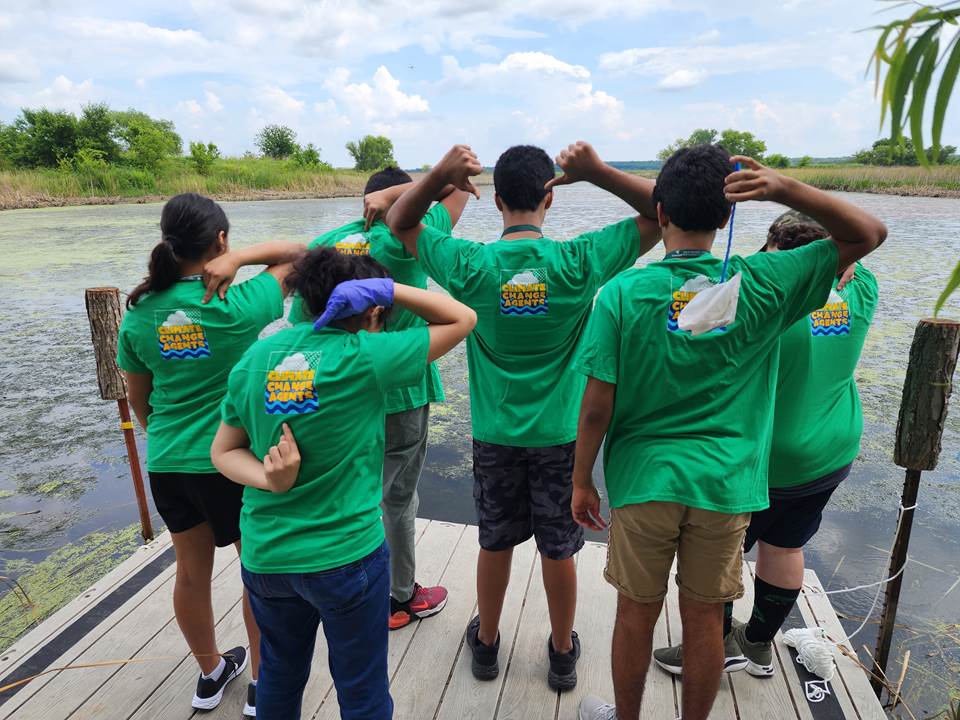Kelly Albus, Bardia Heidari, Dean Minchillo, Emily Monroe, and Samantha Murray.
The Dallas-Fort Worth metroplex faces many water-related challenges in the coming decades, as population growth simultaneously increases water demand and alters the landscape, while impacts from climate change affect the available water supply. Texas A&M AgriLife has teams of experts around the region working to deliver research-proven solutions to communities, including the Texas Water Resources Institute’s Urban Water Team.
Located at the Texas A&M AgriLife Research and Extension Center in Dallas, TWRI’s Urban Water Program brings expertise in blue-green infrastructure, nature-based solutions to stormwater problems, citizen science, environmental education, urban and suburban water conservation, water-smart landscaping, natural resources project management, and long-term urban hydrology.
“The metroplex is a critically important place to provide research-based solutions to the water quality and quantity problems facing Texans, and our Urban Water Program is working to bring those solutions to communities and stakeholders,” said Allen Berthold, TWRI interim director.
The Urban Water Program team includes:
- Kelly Albus, Ph.D., is a TWRI research scientist with expertise in citizen science, environmental education, measuring educational impacts, community engagement, blue-green infrastructure, and innovative education initiatives.
- Bardia Heidari, Ph.D., TWRI research scientist, is an expert on urban hydrology and flooding, impacts of climate change on water infrastructure, application of data science techniques in stormwater management, and blue-green infrastructure design and planning.
- Dean Minchillo, TWRI program specialist, delivers research-based and locally relevant programs to promote the protection of Texas’ natural resources, improve water conservation and build sustainable programs supporting Texas A&M AgriLife’s mission.
- Emily Monroe, TWRI project specialist, brings experience in natural resources project management to the Urban Water Team, leading and tracking project proposals, budgets, and implementation progress for numerous TWRI projects around the state.
- Samantha Murray, TWRI geospatial analyst, provides GIS mapping, spatial data analysis, spatial modeling and remote sensing and contributes to projects focused on urban hydrology, stormwater management, and blue-green infrastructure.
“We are a visionary, interdisciplinary team, solving challenging water problems in rapidly growing and changing urban environments,” Heidari said. “Our Urban Water Team is perfectly situated to investigate and address many of the urban water research and education needs facing DFW and other urban areas across the state and country.”

Increasing blue-green infrastructure use in DFW
One solution that Heidari and the Urban Water Program are delivering to DFW communities, engineers and professionals is blue-green infrastructure (BGI).
“With diverse expertise in addressing stormwater management, environmental education and stewardship and water conversation, we are building communities of practice around solutions such as blue-green infrastructure, which has been proven via academic research as a sustainable solution for resilient stormwater management,” he said.
Common examples of BGI, sometimes also green stormwater infrastructure or nature-based solutions, are bioretention cells, rain gardens, green roofs, rainwater harvesting systems, permeable pavements and constructed wetlands.
Heidari and Minchillo co-authored a scientific analysis of the institutional barriers preventing cities from using BGI more often in 2023. The researchers found that the major reasons cities were not implementing BGI were socio-cultural, financial, institutional and governance, legislative and regulatory, technical and biophysical; and many of the factors were interrelated.
In 2022, Heidari and Fouad H. Jaber, Ph.D., professor of biological and agricultural engineering and Extension specialist in the Urban Ecological Engineering Program at the Texas A&M AgriLife Dallas Center, published research funded by the Nature Conservancy and centered on stormwater infrastructure in the City of Dallas.
Using GIS data mapping and numerical modeling, they showed that BGI could alleviate flood-prone areas across Dallas. Their analysis accounted for the changing climate and increased major rain events expected over the next 45 years. BGI was found to reduce overflows for all storms modeled by 17% - 31% and to delay peak flows potentially reducing localized pluvial flooding.
Today Urban Water Program and Dallas Center scientists provide city planners and leaders with educational trainings about BGI, demonstrating that BGI is a valuable tool for flood-risk reduction, water quality improvement and enhanced biodiversity — all while increasing safety and conserving funds.
Citizen science and sustainable communities
Citizen science technology, programming and participation are booming across the United States, and Albus is one of the environmental educators in Texas helping equip the next generations of students and educators with citizen science best practices.
“The latest in water management science tells us that a sustainable future will require participation from everyone,” Albus said. “Unfortunately, many of the communities most at risk for water insecurity lack access to water education, information, or decision-making. I design innovative and accessible ways for citizen scientists, or non-professionals with diverse backgrounds, to participate in water management and research in their own communities — starting with urban youth.”

Albus is the Texas leader of National Geographic’s Slingshot Challenge, which supports middle and high school students as they produce environmental videos and compete against their peers. She shares environmental education content on Instagram, YouTube and more to increase program reach and engagement. She also trains K-12 educators and teachers in environmental monitoring and citizen science, with a research focus on measuring the impacts of environmental education programs.
“Through the Slingshot Challenge, Classroom2Community and ACCESS Water programs we are working to empower youth who are making a better future for those downstream,” Albus said. “Everyone is part of a watershed, so with more accessible and transparent programming, and research into the impacts of these programs, we can invite more people to take an active role in watershed stewardship.”
The Urban Water Team also helps bring conservation-minded educational workshops to communities around DFW through the Healthy Lawns Healthy Waters program. Minchillo helps produce and deliver Healthy Lawns Healthy Waters workshops, which give residents the knowledge and tools to maintain sustainable residential landscapes that conserve water.
Connect with the TWRI Urban Water Team
To learn more about TWRI’s urban water research and education work:
- Visit tamu.edu/urban-water
- Visit twri.tamu.edu
- Read more news articles about the Urban Water Program
- Contact the team


